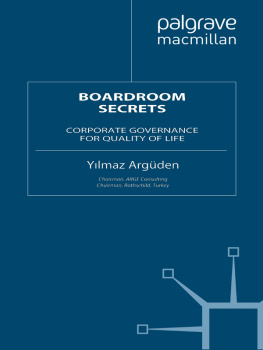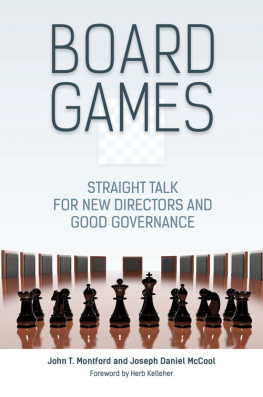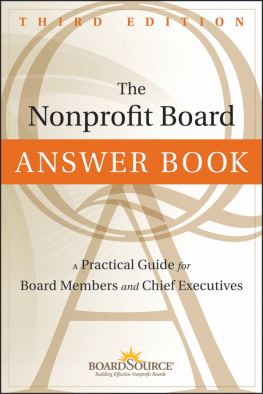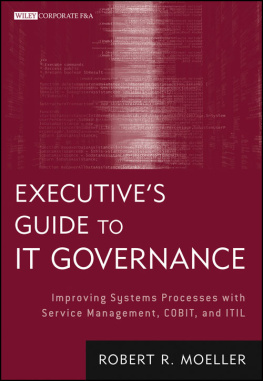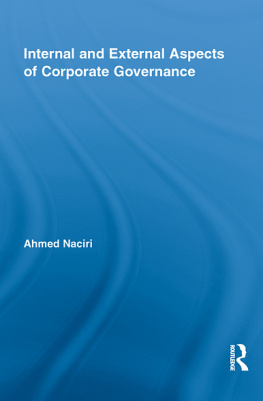BOARDROOM SECRETS
BOARDROOM SECRETS
CORPORATE GOVERNANCE FOR QUALITY OF LIFE
Yilmaz Argden
Chairman, ARGE Consulting Chairman, Rothschild, Turkey


Yilmaz Argden 2009
All rights reserved. No reproduction, copy or transmission of this publication may be made without written permission.
No portion of this publication may be reproduced, copied or transmitted save with written permission or in accordance with the provisions of the Copyright, Designs and Patents Act 1988, or under the terms of any licence permitting limited copying issued by the Copyright Licensing Agency, Saffron House, 610 Kirby Street, London EC1N 8TS.
Any person who does any unauthorized act in relation to this publication may be liable to criminal prosecution and civil claims for damages.
The author has asserted his right to be identified as the author of this work in accordance with the Copyright, Designs and Patents Act 1988.
First published in English in 2009 by
PALGRAVE MACMILLAN
Palgrave Macmillan in the UK is an imprint of Macmillan
Publishers Limited, registered in England, company number
785998, of Houndmills, Basingstoke, Hampshire RG21 6XS.
Palgrave Macmillan in the US is a division of St Martins Press LLC, 175 Fifth Avenue, New York, NY 10010.
Palgrave Macmillan is the global academic imprint of the above companies and has companies and representatives throughout the world.
Palgrave and Macmillan are registered trademarks in the United States, the United Kingdom, Europe and other countries
ISBN 978-0-230-23077-4
This book is printed on paper suitable for recycling and made from fully managed and sustained forest sources. Logging, pulping and manufacturing processes are expected to conform to the environmental regulations of the country of origin.
A catalogue record for this book is available from the British Library.
A catalog record for this book is available from the Library of Congress.
10 9 8 7 6 5 4 3 2 1
18 17 16 15 14 13 12 11 10 09
Printed and bound in Great Britain by
CPI Antony Rowe, Chippenham and Eastbourne
Dedication
To my father, who taught me the value of ethical conduct and self-discipline ...
To my mother, who taught me positive and constructive thinking and pre-emptive planning ...
To my wife, who brought color and peace of mind to my life ...
And to my children, in whom my hopes for the future flourish ...
Preface
All virtue is summed up in dealing justly.
Aristotle
Trust is the foundation of development both in relations among humans, as well as in relations between institutions such as the firm and its stakeholders. As the world continues to get smaller, the mutual interdependence of the corporations and their stakeholders grows larger. To achieve success, institutions rely increasingly upon the utilization of not only their own resources, but also those of others. In order to gain access to the resources of others, institutions need to create trustworthy relationships. Therefore, the key to success and development is gaining the trust of present and potential stakeholders.
For example, in order to be able to grow fast and compete globally firms need to gain access to global credit or equity capital markets. Similarly, as the role of corporations in the development of the worlds economy increases and the scope of their influence widens, so does the breadth of their responsibilities. License to operate increasingly requires fulfillment of the firms responsibilities toward the community. The trustworthiness of corporate architectures, processes, and behaviors becomes an indispensable characteristic of the corporation not only for their shareholders, but also for their stakeholders and in particular for financial markets. The quality of management is a function of the competencies of the people, as well as the organizational infrastructure and culture.
Corporate governance refers to the reliability and transparency of the organizational infrastructure that defines not only the principles of the relations between the large and small shareholders, the board of directors, the top management, and the employees, but also the way responsibilities and authority are distributed throughout the organization. The relevance of corporate governance is not limited to the aforementioned groups, but extends further to creditors, suppliers, customers, and society as a whole. Corporate governance is the foundation of corporate trust.
While there is no single recipe for corporate trust, certain applications are considered good practice. For example, the principle of the separation of powers, a key principle in democracies, is applied to corporations by separating the roles of the chairperson and the CEO, or by making sure that the audit committees are comprised of independent members of the board, who are also responsible for the hiring and oversight of the independent audit firms.
One of the key elements of gaining trust is transparency. For this reason, the timely, simultaneous, and adequate disclosure of relevant information to all stakeholders is increasingly becoming the norm for gaining trust. In corporate disclosures, being fair to all stakeholders, and not differentiating among the shareholders, regardless of the size of their holdings or whether if they are represented on the board, is a key requirement. Hence we see the increasing prevalence of insider-trading restrictions and strict disclosure requirements, especially for public companies.
Gaining the trust of others is a valuable but difficult endeavor, not only for individuals, but also for institutions. While achieving the status of being trustworthy is a long process, trust could be lost very quickly. In gaining trust, actions speak louder than words, as consistency of actions is a more dependable indicator of preferences and priorities than words.
Corporations that flourish through the utilization of global resources are becoming increasingly aware of the need to be accountable towards those who have a stake in those resources. As our dependence on global resources increases, we need to be aware of the need to have our governance systems and attitudes gain a global dimension as well. Throughout the world, religions are notable for their longevity as institutions. The level of transparency and accountability that is being faced by the corporations seeking longevity parallels some key principles of religions, such as assuming responsibility for ones actions regardless of the existence of a witness; or the impossibility of escaping from the day of reckoning.
Today, successful and sustainable organizations need to demonstrate a willingness to involve stakeholders in decision-making; to embrace a culture of transparency and accountability; to be fair and consistent in relations with stakeholders; and to have an organizational infrastructure that ensures corporate trust.
The most important element of organizational infrastructure is the board of directors. The board has the ultimate decision-making power and therefore the ultimate responsibility towards the stakeholders and the sustainability of the corporation. Therefore, issues such as the composition, the agenda, the processes of the board, and how the board develops its own effectiveness as a team are key to ensuring the quality of the governance of a corporation. Quality of governance is as dependent on the organizational structure and decision-making processes of the firm as it is on the quality of the key people that make up the board and the management team.

